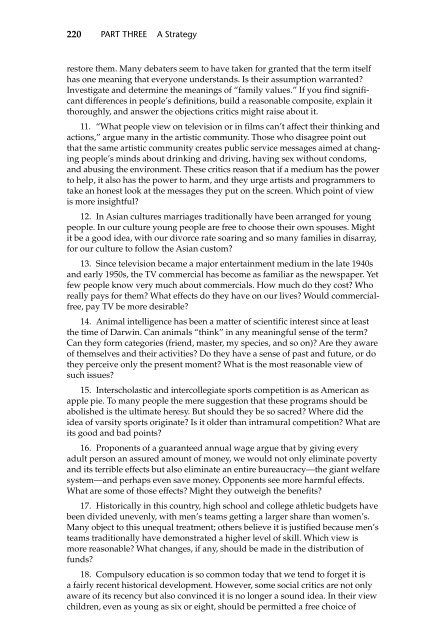Beyond Feelings
Beyond Feelings
Beyond Feelings
Create successful ePaper yourself
Turn your PDF publications into a flip-book with our unique Google optimized e-Paper software.
220 PART THREE A Strategy<br />
restore them. Many debaters seem to have taken for granted that the term itself<br />
has one meaning that everyone understands. Is their assumption warranted?<br />
Investigate and determine the meanings of “family values.” If you find significant<br />
differences in people’s definitions, build a reasonable composite, explain it<br />
thoroughly, and answer the objections critics might raise about it.<br />
11. “What people view on television or in films can’t affect their thinking and<br />
actions,” argue many in the artistic community. Those who disagree point out<br />
that the same artistic community creates public service messages aimed at changing<br />
people’s minds about drinking and driving, having sex without condoms,<br />
and abusing the environment. These critics reason that if a medium has the power<br />
to help, it also has the power to harm, and they urge artists and programmers to<br />
take an honest look at the messages they put on the screen. Which point of view<br />
is more insightful?<br />
12. In Asian cultures marriages traditionally have been arranged for young<br />
people. In our culture young people are free to choose their own spouses. Might<br />
it be a good idea, with our divorce rate soaring and so many families in disarray,<br />
for our culture to follow the Asian custom?<br />
13. Since television became a major entertainment medium in the late 1940s<br />
and early 1950s, the TV commercial has become as familiar as the newspaper. Yet<br />
few people know very much about commercials. How much do they cost? Who<br />
really pays for them? What effects do they have on our lives? Would commercialfree,<br />
pay TV be more desirable?<br />
14. Animal intelligence has been a matter of scientific interest since at least<br />
the time of Darwin. Can animals “think” in any meaningful sense of the term?<br />
Can they form categories (friend, master, my species, and so on)? Are they aware<br />
of themselves and their activities? Do they have a sense of past and future, or do<br />
they perceive only the present moment? What is the most reasonable view of<br />
such issues?<br />
15. Interscholastic and intercollegiate sports competition is as American as<br />
apple pie. To many people the mere suggestion that these programs should be<br />
abolished is the ultimate heresy. But should they be so sacred? Where did the<br />
idea of varsity sports originate? Is it older than intramural competition? What are<br />
its good and bad points?<br />
16. Proponents of a guaranteed annual wage argue that by giving every<br />
adult person an assured amount of money, we would not only eliminate poverty<br />
and its terrible effects but also eliminate an entire bureaucracy—the giant welfare<br />
system—and perhaps even save money. Opponents see more harmful effects.<br />
What are some of those effects? Might they outweigh the benefits?<br />
17. Historically in this country, high school and college athletic budgets have<br />
been divided unevenly, with men’s teams getting a larger share than women’s.<br />
Many object to this unequal treatment; others believe it is justified because men’s<br />
teams traditionally have demonstrated a higher level of skill. Which view is<br />
more reasonable? What changes, if any, should be made in the distribution of<br />
funds?<br />
18. Compulsory education is so common today that we tend to forget it is<br />
a fairly recent historical development. However, some social critics are not only<br />
aware of its recency but also convinced it is no longer a sound idea. In their view<br />
children, even as young as six or eight, should be permitted a free choice of


